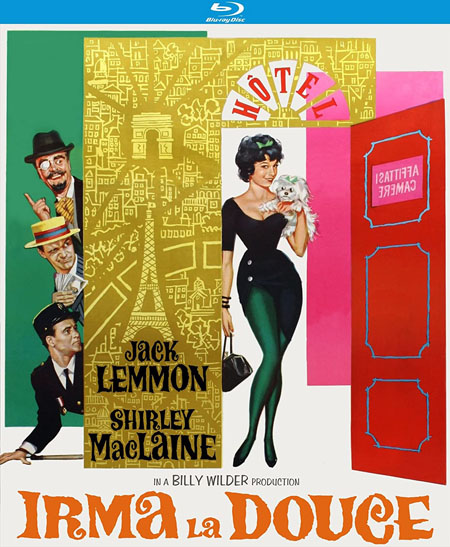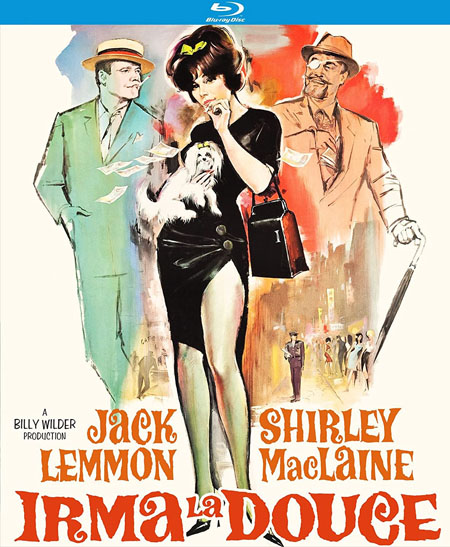
“POULES,
MECS, AND FLICSâ€
By
Raymond Benson
Billy
Wilder’s 1963 romantic comedy, Irma la Douce, is perhaps yet another
property that would go on the politically correct list of Movies That Couldn’t
Be Made Today. The times were certainly different in the early 60s regarding
the relationships between the sexes. This was an era when the nudge-nudge,
wink-wink attitudes toward sex were assuredly male-oriented. The brilliant
Wilder had always drifted toward the risqué in his pictures (The Seven Year
Itch, Some Like it Hot). Irma la Douce is no exception, and
some of the sequences might raise the eyebrows of the cancel culture crowd.
The
entertaining Shirley MacLaine stars as the titular character (which translates
to “Irma the Sweetâ€), a streetwalker in modern day Paris (1963, that is), who
stands on Rue de Casanova along with several other poules (the French
slang for these ladies of the night). The women’s mecs, or pimps, are
always nearby, usually hanging out in the Café Moustache, which is run by the
witty and erudite barkeep known as, naturally, Moustache (Lou Jacobi, who comes
near to stealing the movie). The flics, or street cops, are in on the
racket, happily accepting bribes from the mecs to keep their poules in
business. Irma is the hooker with the proverbial “heart of gold†and is hugely
popular, despite having a little champagne-drinking dog as a constant
companion. Her mec, Hippolyte (Bruce Yarnell), is mean, controlling, and
treats Irma terribly, but that is apparently what all the pimps do.
Enter
beat cop Nestor Patou (Jack Lemmon), who is 2/3 honest and enthusiastic, and
1/3 very naïve. On his first day on the job, he attempts to arrest all the
women, which of course gets him fired. His chief, Inspector Lefevre (Herschel
Bernardi), protects the prostitution racket because, well, it’s tradition. But
Nestor has met Irma in the process, and the two of them fall in love. Nestor
proceeds, then, to become her mec after coming to blows with Hippolyte. Things
become more complicated when Nestor has the silly idea of borrowing a large
amount of money from Moustache, disguising himself as a wealthy British man,
“Lord X,†and paying Irma the money simply for “conversation and
companionship.†Irma then hands over the money to Nestor, which makes him look
good to all the other pimps, and then Nestor repays Moustache. The scheme
works… until it doesn’t.
The
whole thing is farcical and hopelessly improbable, and yet Lemmon and MacLaine
(and Jacobi) are so winning that one can’t help but go along for the ride.
There are plenty of laughs, much bawdy humor, and tons of witty dialogue. The
problem with Irma la Douce is that it is simply too long. The picture
runs 2 hours and 20 minutes, and very few comedies can sustain that kind of
length. A half hour could easily have been trimmed out of the movie. It’s not a
fatal flaw, but one that keeps Irma from residing among the top tier of
Wilder classics.
Nevertheless,
MacLaine was awarded with an Oscar nomination for Best Actress for her role.
She is decidedly cute, bubbly, and sassy throughout, and for most of the film
she’s dressed in skimpy clothing or lingerie or not dressed at all (but there
is no nudity on display). André Previn won an
Oscar for his delightful musical score. The script, by Wilder and his then
current collaborator, I. A. L. Diamond, is quaintly sexist and ribald,
providing Lemmon with many turns of his trademark exuberance.
Interestingly,
the Irma role was supposed to have been played by Marilyn Monroe, but she died
before production began. What would Irma la Douce have been like with a
re-teaming of Lemmon and Monroe? One can only imagine. Instead, we got the
genuinely satisfactory reunion between Lemmon and MacLaine, who had made The
Apartment for Wilder three years earlier.

Watch
for a young James Caan in a walk-on role as an American G.I. customer of one of
the poules, and yes, that’s Louis Jourdan’s voice as the narrator in the
beginning sequence.
Kino
Lorber’s new high definition restoration beautifully shows off Joseph
LaShelle’s Oscar-nominated cinematography—the colors are rich and vivid in
their widescreen glory. There are English subtitles for the hearing impaired,
along with two separate audio commentaries—one by film historian Joseph
McBride, author of How Did Lubitsch Do It?, and another by film
historian Kat Ellinger. The theatrical trailer and other Kino Lorber release
trailers and reversible sleeve artwork round out the package.
Irma
la Douce is
for fans of Wilder, Lemmon, and MacLaine, and for movie aficionados who can
appreciate a picture within the context of when it was released. Nudge-nudge,
wink-wink.
CLICK HERE TO ORDER FROM AMAZON
